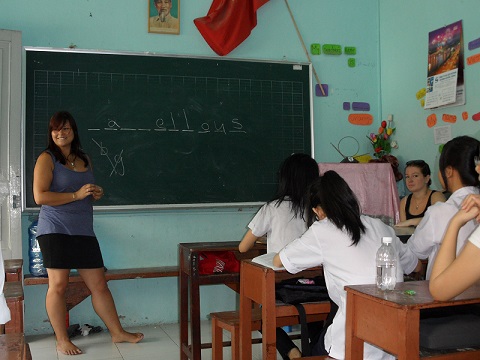In recent years, Vietnam has emerged as a captivating destination for educators around the globe, offering a plethora of opportunities to teach, learn, and grow amidst its rich cultural tapestry and dynamic educational landscape. Whether you’re drawn to the bustling streets of Hanoi or the serene beauty of Halong Bay, teaching in Vietnam promises an adventure that combines professional development with unparalleled life experiences. This guide aims to weave together essential information, including teaching jobs, salary insights, and the critical ethical considerations of teaching without a degree or TEFL certification.
Teaching Opportunities in Vietnam

Vietnam’s education landscape presents a variety of teaching options, including language centers, public schools, and international schools. The year 2024 continues to see growth in these areas, making it an opportune time to explore teaching positions. Each setting offers distinct experiences, schedules, and class sizes:
- Language Centers: These are the most common workplaces for English teachers, offering classes after school and on weekends. Language centers cater to a wide range of needs, from general English to specialized test preparation like for the IELTS. They typically provide small class sizes and may offer benefits like work permit assistance and paid holidays.
- Public Schools: Teaching at public schools means larger class sizes (around 40-50 students) and a more traditional 8 am – 4 pm schedule. Public school positions often involve teaching at multiple locations throughout the week.
- International Schools: Offering the highest salaries and most comprehensive benefits, international schools demand a higher level of qualification and experience from teachers. They follow a more Westernized curriculum and have smaller, more diverse class sizes. The expectations here include not only teaching English but possibly other subjects as well.
Eligibility and Requirements

The requirements for teaching in Vietnam vary depending on the type of institution. Generally, a Bachelor’s degree, TEFL certification, fluent English proficiency, and a clear criminal background are the minimum requirements. International schools might demand additional qualifications, such as professional teaching certifications and years of experience.
Salary Expectations and Visa Requirements
Salaries for teaching jobs in Vietnam can range widely based on the institution, location, and your qualifications. On average, English teachers can expect to earn between $1,000 to $1,500 per month. International schools might offer higher salaries, but these positions also require more advanced qualifications.
For visa and work permit requirements, teachers will typically need a business visa to enter Vietnam, which can be converted into a work permit with the sponsorship of an employing institution. The process involves submitting your degree, teaching certification, and a health check among other documents. It’s advisable to work closely with your employer, as they will often guide you through this process.

Teaching Without a Degree or TEFL: Ethical Considerations
The eagerness to teach in Vietnam should be matched with a commitment to providing quality education. This means understanding that teaching in Vietnam without a degree or a TEFL certification raises ethical concerns. While the desire to help and the need for English teachers in Vietnam are undeniable, stepping into a classroom unqualified does a disservice to students deserving of a quality education. Quality education is a right, and every student deserves teachers who are equipped with the necessary skills and knowledge.
Investing in a TEFL course is a step towards ethical and professional teaching practices.
Gain a TEFL Certification
Founded in 2010, the International TEFL Academy has quickly ascended as a global leader in TEFL certification for aspiring English teachers both abroad and online. Offering accredited TEFL certification classes both online and in more than 20 locations worldwide, including Vietnam, ITA stands out for its commitment to quality education and comprehensive support for its students and graduates.

ITA goes a step further with its guaranteed job placement program for those who qualify. This program removes the uncertainty and stress often associated with finding a teaching job in Vietnam. From navigating through pushy recruiters and confusing contracts to dealing with visa paperwork, ITA’s program offers a seamless transition into your teaching career in Vietnam.
With ITA’s program, you’ll receive a comprehensive orientation to Vietnamese culture and language, ensuring a smooth adjustment to life and work in Vietnam.
You can also get TEFL-certified with IVHQ or Volunteering Solutions.
Alternative Paths

For those who wish to get started teaching in Vietnam without the formal qualifications, volunteering or participating in language exchange programs presents a viable alternative. These opportunities allow you to engage with the community, gain experience, and make a difference, albeit on a more informal basis. They serve as a stepping stone to preparing for a more formal role in the future.
Volunteer Teaching Opportunities
Here are some reputable providers offering volunteer teaching opportunities in Vietnam:



























Munira Maricar · Travel Writer
With an international living background spanning Singapore, Qatar, Japan, and Mexico, Munira enjoys sharing insights on immersive travel while emphasizing the vital role of cultural respect and ethical engagement. Her extensive experience offers a unique perspective that inspires others to explore the world through service, ensuring that every journey respects and contributes positively to local traditions and communities.